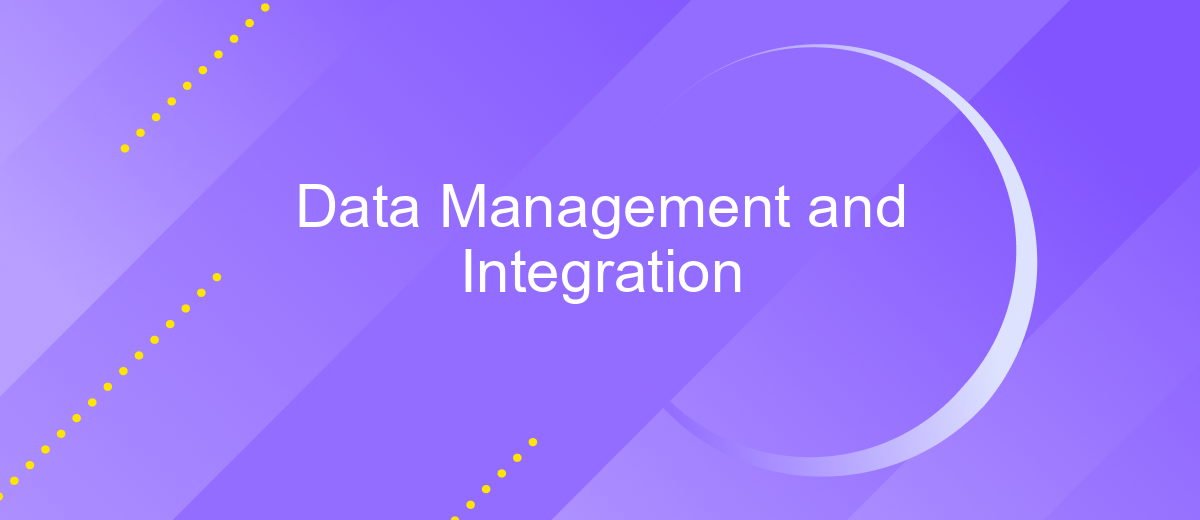Data Management and Integration
Data management and integration are critical components in today's data-driven world. Effective data management ensures that data is accurate, accessible, and secure, while integration allows disparate data sources to work together seamlessly. This article explores the best practices, tools, and strategies for optimizing data management and integration to drive better decision-making and operational efficiency in organizations.
Data Management
Effective data management is crucial for organizations to harness the full potential of their data assets. It involves the collection, storage, and utilization of data in a secure and efficient manner. Proper data management ensures data integrity, accessibility, and reliability, which are essential for informed decision-making and strategic planning.
- Data Collection: Gathering data from various sources, including internal systems and external databases.
- Data Storage: Utilizing robust storage solutions to maintain data in a structured and retrievable format.
- Data Security: Implementing measures to protect data from unauthorized access and breaches.
- Data Integration: Combining data from different sources to provide a unified view, often facilitated by tools like ApiX-Drive.
- Data Governance: Establishing policies and procedures to ensure data quality and compliance.
By leveraging tools such as ApiX-Drive, organizations can streamline their data integration processes. ApiX-Drive allows for seamless connection between various applications and services, ensuring that data flows smoothly across systems. This not only enhances efficiency but also ensures that data is consistently up-to-date and accurate, supporting better business outcomes.
Data Integration

Data integration is a critical component in managing the vast amounts of data generated by modern organizations. It involves combining data from different sources and providing users with a unified view. This process not only enhances the accuracy and consistency of data but also ensures that all departments within an organization can access the same information, thereby improving decision-making and operational efficiency. Effective data integration can be achieved through various methods, including ETL (Extract, Transform, Load) processes, data warehousing, and the use of middleware solutions.
One of the tools that significantly simplify the process of data integration is ApiX-Drive. ApiX-Drive offers a user-friendly platform that allows businesses to automate data transfer between various applications without requiring extensive technical expertise. By leveraging ApiX-Drive, organizations can seamlessly connect their CRM systems, marketing platforms, and other essential software, ensuring real-time data synchronization. This not only reduces the manual effort involved in maintaining data consistency but also enhances the overall productivity of the organization.
Data Quality

Ensuring data quality is a critical aspect of data management and integration. High-quality data is accurate, complete, consistent, and timely, which is essential for making informed business decisions. Poor data quality can lead to errors, inefficiencies, and ultimately, lost revenue. Implementing effective data quality measures can significantly enhance the reliability and usability of data.
- Data Profiling: Analyze data to understand its structure, content, and quality.
- Data Cleansing: Correct errors and inconsistencies in the data.
- Data Validation: Ensure data meets predefined standards and rules.
- Data Enrichment: Enhance data by adding relevant information from external sources.
- Data Monitoring: Continuously track data quality to identify and resolve issues promptly.
Utilizing integration services like ApiX-Drive can streamline the process of maintaining data quality. ApiX-Drive allows for seamless data integration across various platforms, ensuring that data is consistently accurate and up-to-date. By automating data transfers and synchronizations, ApiX-Drive helps reduce the risk of human error and enhances overall data quality management.
Data Governance

Data governance is essential for ensuring the quality, security, and integrity of data within an organization. It involves the establishment of policies, procedures, and standards to manage data effectively and ensure compliance with regulatory requirements. Proper data governance helps organizations make informed decisions and maintain trust with stakeholders.
Effective data governance requires the collaboration of various departments, including IT, legal, and business units. This collaboration ensures that data is accurate, consistent, and accessible to authorized users. Organizations must also implement robust data governance frameworks to address data privacy and security concerns, thereby reducing the risk of data breaches and non-compliance penalties.
- Establish clear data ownership and accountability.
- Implement data quality management practices.
- Ensure data security and privacy compliance.
- Develop and enforce data usage policies.
- Utilize tools like ApiX-Drive for seamless data integration.
By leveraging tools such as ApiX-Drive, organizations can streamline data integration processes, connecting various data sources and automating workflows. This not only enhances data quality but also improves operational efficiency. Ultimately, a strong data governance strategy enables organizations to harness the full potential of their data assets, driving better business outcomes.


Data Security
Data security is a critical aspect of data management and integration, ensuring that sensitive information remains protected from unauthorized access and breaches. Implementing robust encryption methods, access controls, and regular security audits are essential practices to safeguard data. Organizations must also stay updated with the latest security protocols and compliance standards to mitigate potential risks associated with data integration processes.
When configuring integrations, utilizing reliable services like ApiX-Drive can enhance data security. ApiX-Drive offers secure, automated data transfer between various platforms, minimizing the risk of human error and unauthorized access. By leveraging such platforms, businesses can streamline their data workflows while maintaining stringent security measures. Regularly updating and monitoring integration settings further ensures that data remains protected throughout its lifecycle.
FAQ
What is Data Management and Integration?
Why is Data Integration important for businesses?
What are some common challenges in Data Management and Integration?
How can businesses automate their Data Integration processes?
What should I consider when choosing a Data Integration tool?
Routine tasks take a lot of time from employees? Do they burn out, do not have enough working day for the main duties and important things? Do you understand that the only way out of this situation in modern realities is automation? Try Apix-Drive for free and make sure that the online connector in 5 minutes of setting up integration will remove a significant part of the routine from your life and free up time for you and your employees.

